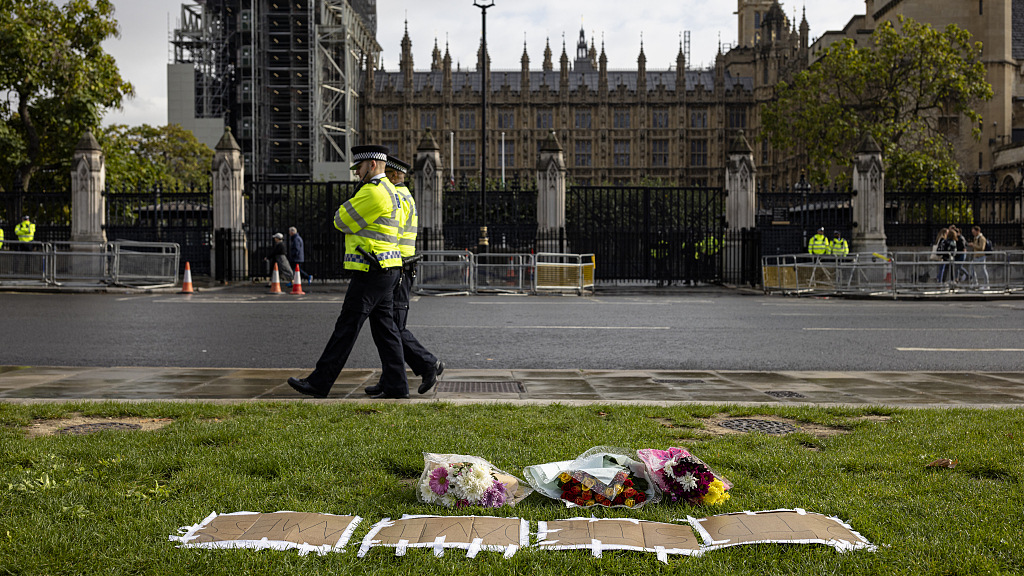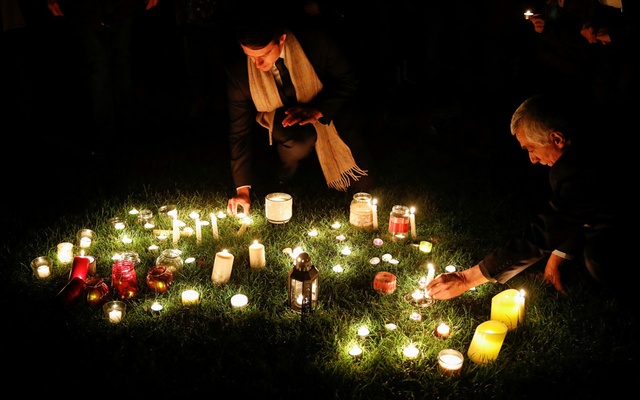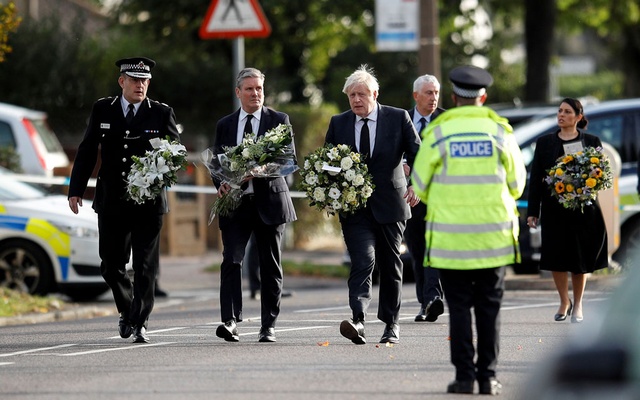
Floral tributes are left outside Parliament in respect for murdered MP David Amess in London, England, October 16, 2021. /CFP
Floral tributes are left outside Parliament in respect for murdered MP David Amess in London, England, October 16, 2021. /CFP
The fatal stabbing of Sir David Amess, a Conservative Member of Parliament (MP), on Friday has shocked the British political establishment, as the country confronts what appears to be a pattern of lone wolf attacks targeting elected officials.
Amess, 69, was stabbed 17 times in full view of the public during a meeting with his constituents at a church in Leigh-on-Sea, east of London. Police have arrested a 25-year-old man and the incident was declared a terrorist attack.
It is the second murder of a sitting British lawmaker in recent years. In 2016, Labour MP Jo Cox, a pro-EU lawmaker, was shot dead outside her office by a far-right extremist days before the Brexit referendum. Another Labour lawmaker, Stephen Timms, was left seriously wounded in a stabbing attack in 2010.
On the other side of UK politics, Amess was not a controversial figure given his long political career, and appeared to be well-liked by colleagues in the House. The father-of-five was known to be an advocate for animal rights and a vocal supporter of an Iranian opposition group. There was no evidence linking his support for the group to the killing.

People light candles during a vigil for MP David Amess, who was stabbed to death during a meeting with constituents in Leigh-on-Sea, Britain, October 16, 2021. /Reuters
People light candles during a vigil for MP David Amess, who was stabbed to death during a meeting with constituents in Leigh-on-Sea, Britain, October 16, 2021. /Reuters
In a statement on Saturday, police said the early investigation had revealed a potential motivation linked to Islamic extremism.
The suspect has been named as Ali Harbi Ali, who is believed to be a British national of Somali heritage living in north London, according to reports by multiple UK media outlets. Police are conducting searches at two locations in the London area.
Reports say the suspect was referred to the national counter-terrorist prevent scheme a few years ago, and had Islamist material on his phone.
Police and security services are reportedly investigating the theory that he was radicalized online during lockdown. They suspect that he may have been inspired by al-Shabaab, an al-Qaeda-affiliated extremist group in Somalia and Kenya.
British tabloid The Sun said that Ali may have targeted Amess "because he was a symbol of the British government."
The suspect, who acted alone, is said to have waived his right to silence on arrest and admitted to fatally stabbing Amess. An emergency worker at the murder scene described the killer as "dead behind the eyes."
Police are trying to establish a motive in order to charge him under the Terrorism Act, which was introduced after the 2005 London bombings. The law allows police to hold a terrorism suspect up to 28 days before making a charge. If convicted, it would lead to harsher sentencing than that for murder.
The Johnson government in April tightened the UK's terrorism laws, which mandate that those convicted of serious acts of terrorism serve a minimum of 14 years in prison. Some critics have argued that prolonging prison terms only serves to radicalize offenders even further.

Chief Constable of Essex Police B. J. Harrington, Britain's Labour Party leader Keir Starmer, Prime Minister Boris Johnson, Speaker of the House Sir Lindsay Hoyle and Home Secretary Priti Patel hold flowers as they arrive at the scene where British MP David Amess was stabbed to death in Leigh-on-Sea, Britain, October 16, 2021. /Reuters
Chief Constable of Essex Police B. J. Harrington, Britain's Labour Party leader Keir Starmer, Prime Minister Boris Johnson, Speaker of the House Sir Lindsay Hoyle and Home Secretary Priti Patel hold flowers as they arrive at the scene where British MP David Amess was stabbed to death in Leigh-on-Sea, Britain, October 16, 2021. /Reuters
Amess' tragic death has drawn attention to the risks for politicians to engage with constituents. British lawmakers hold regular in-person meetings with their constituents – known as surgeries – to hear their concerns. Members of the public can meet their MPs through booking, and details of the meeting are published in advance.
In the wake of Friday's attack, UK Home Secretary Priti Patel ordered police across the country to review security arrangements for all 650 MPs.
Tobias Ellwood, a Conservative MP who was hailed as a hero for saving a police officer in the Westminster terror attack in 2017, has called for a temporary suspension of these face-to-face meetings until a security review is completed.
A specialist police unit set up to investigate threats against MPs said 678 crimes against lawmakers were reported between 2016 and 2020.
Patel said that "we cannot be cowed" by those seeking to stop the country's democracy from functioning as normal. The husband of Jo Cox tweeted: "Attacking our elected representatives is an attack on democracy itself."
Amess also raised the issue in his book. Calling Cox's murder "totally unexpected," he said the event had changed the way MPs interact with the public.
"These increasing attacks have rather spoilt the great British tradition of the people openly meeting their elected politicians," he wrote.

